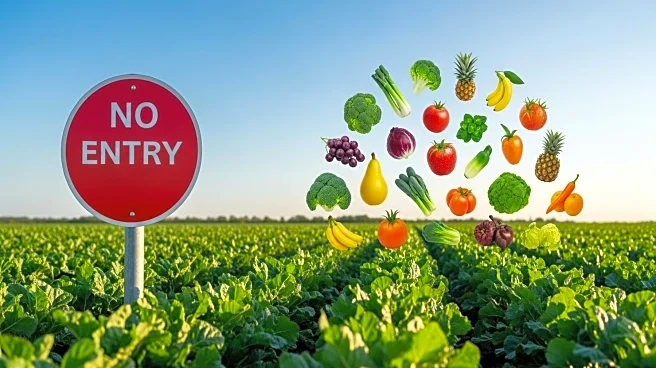What's Happening?
Mexico has announced a significant ban on 35 hazardous pesticides, marking the country's most extensive prohibition in over three decades. President Claudia Sheinbaum signed the decree, which prohibits the production, import, commercialization, and use of these substances due to their severe risks to human health, biodiversity, and ecosystems. The decision was made following a comprehensive evaluation by the Secretariats of Agriculture, Health, Environment, and Economy, which reviewed scientific evidence supporting the ban. This move aligns with Mexico's national strategy to protect agricultural workers, improve public health, and promote sustainable agricultural practices.
Why It's Important?
The ban on these pesticides is crucial for several reasons. Many of the substances are persistent organic pollutants that can remain in soil and water, accumulate in human and animal tissues, and move through the food chain, causing long-term health and environmental damage. By prohibiting these chemicals, Mexico aims to safeguard public health and the environment, while also responding to civil society's demands for safer agricultural practices. This action strengthens Mexico's commitment to healthy food production and the preservation of natural resources, aligning with international best practices and global treaties such as the Stockholm and Rotterdam Conventions.
What's Next?
Following the publication of the decree in the Official Journal of the Federation, the Federal Public Administration will revoke or deny any authorizations related to the banned pesticides. The government is collaborating with the phytosanitary protection industry and scientific community to provide safer alternatives, particularly for small and medium-sized farmers. This ban is part of a broader strategy, with additional substances under review for future prohibition, signaling a shift towards more sustainable agricultural practices in Mexico.
Beyond the Headlines
The ban reflects a global trend towards phasing out harmful agrochemicals in favor of environmentally friendly practices. It highlights ethical considerations in agriculture, emphasizing the need to balance food self-sufficiency with sustainable practices. Mexico's decision may influence other countries to adopt similar measures, promoting a global shift towards responsible agricultural models.











